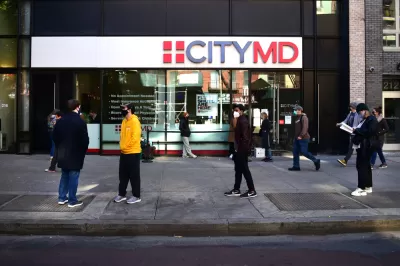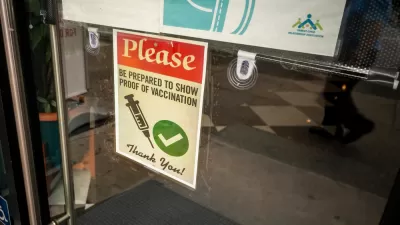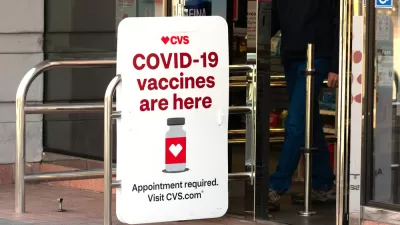The Biden Administration's most sweeping and possibly controversial action to increase COVID vaccinations has been stayed twice by a federal appeals court and is likely headed to the Supreme Court

The timeline of the rulings by the New Orleans-based U.S. Court of Appeals for the Fifth Circuit on one of the mandates included in a multi-prong vaccination strategy that applies to the nation's corporate workforce was first announced by President Joe Biden on Sept. 9 has been remarkably swift.
Rule issued, and promptly stayed
On Thursday, Nov. 4, the U.S. Department of Labor's Occupational Safety and Health Administration (OSHA) announced a new emergency temporary standard to protect more than 84 million workers from the spread of the coronavirus on the job.
Under this standard, private employers of 100 or more people "must develop, implement and enforce a mandatory COVID-19 vaccination policy, unless they adopt a policy requiring employees to choose to either be vaccinated or undergo regular COVID-19 testing and wear a face covering at work," according to OSHA.
On Friday, the proposed rule was published in the Federal Register, setting Dec. 6 as the deadline for submission of comments from the public. On Saturday, a three-judge panel of the U.S. Court of Appeals for the Fifth Circuit stayed the rule in response to petitions filed by the states of Texas, Louisiana, Mississippi, Utah, South Carolina, and companies that claim they’re adversely affected by the rule, according to Bloomberg Law
"The Fifth Circuit panel said in a brief order, signed by a deputy clerk, that the judges were blocking the regulation 'because the petitions give cause to believe there are grave statutory and constitutional issues with the mandate," reported Isabella Grullón and Lauren Hirsch and for The New York Times on Nov. 6.
At the core of the legal challenge is the question of whether OSHA exceeded its authority in issuing the rule and whether such a mandate would need to be passed by Congress.
[The panel] said the rule was suspended “pending further action by this court.”
A second ruling
That action took less than a week after hearing from the Justice Department on Monday and the plaintiffs on Tuesday.
"In a 22-page ruling [pdf] issued on Friday, a three-judge panel on the U.S. Court of Appeals for the Fifth Circuit, in New Orleans, held that a group of challengers to the mandate issued by the Biden administration was likely to succeed in its claim that it was an unlawful overreach, and barred the government from moving forward with it," reported Charlie Savage on Nov. 12 (source article). The case is BST Holdings LLC v. OSHA.
Once again, the theme of public health vs. individual rights surfaced, expressed by Judge Kurt D. Engelhardt, who wrote:
"The public interest is also served by maintaining our constitutional structure and maintaining the liberty of individuals to make intensely personal decisions according to their own convictions — even, or perhaps particularly, when those decisions frustrate government officials.”
"On the dubious assumption that the Mandate does pass constitutional muster—which we need not decide today—it is nonetheless fatally flawed on its own terms," wrote Engelhardt and Judges Edith H. Jones and Kyle Duncan.
"The ruling by the panel of the Fifth Circuit is unlikely to be the final word," adds Savage.
Some challenges to the mandate are in other circuits, and the cases will be consolidated before a randomly chosen one of those jurisdictions. The Supreme Court is expected to eventually decide the matter.
Related in Planetizen:
- Biden Orders Large Employers to Require Vaccination or COVID Testing, September 13, 2021
- Supreme Court Allows Indiana University's Vaccine Mandate to Remain in Place, August 16, 2021
- Mandating and Verifying Vaccinations, July 19, 2021
- SCOTUS: Freedom of Religion Trumps Public Health in a Pandemic, November 29, 2020
Hat tip to Jordan Williams of The Hill who highlighted the "fatally flawed" description by the judges.
FULL STORY: Appeals Court Extends Block on Biden’s Vaccine Mandate for Employers

Planetizen Federal Action Tracker
A weekly monitor of how Trump’s orders and actions are impacting planners and planning in America.

Maui's Vacation Rental Debate Turns Ugly
Verbal attacks, misinformation campaigns and fistfights plague a high-stakes debate to convert thousands of vacation rentals into long-term housing.

San Francisco Suspends Traffic Calming Amidst Record Deaths
Citing “a challenging fiscal landscape,” the city will cease the program on the heels of 42 traffic deaths, including 24 pedestrians.

Amtrak Rolls Out New Orleans to Alabama “Mardi Gras” Train
The new service will operate morning and evening departures between Mobile and New Orleans.

The Subversive Car-Free Guide to Trump's Great American Road Trip
Car-free ways to access Chicagoland’s best tourist attractions.

San Antonio and Austin are Fusing Into one Massive Megaregion
The region spanning the two central Texas cities is growing fast, posing challenges for local infrastructure and water supplies.
Urban Design for Planners 1: Software Tools
This six-course series explores essential urban design concepts using open source software and equips planners with the tools they need to participate fully in the urban design process.
Planning for Universal Design
Learn the tools for implementing Universal Design in planning regulations.
Heyer Gruel & Associates PA
JM Goldson LLC
Custer County Colorado
City of Camden Redevelopment Agency
City of Astoria
Transportation Research & Education Center (TREC) at Portland State University
Jefferson Parish Government
Camden Redevelopment Agency
City of Claremont




























